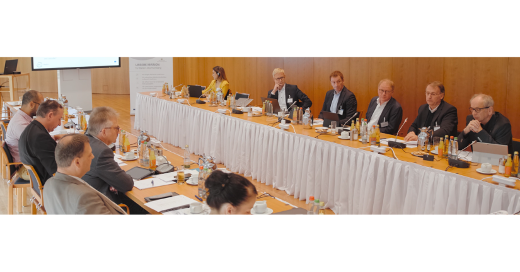In recent years there has been rapid growth in the field of medical and health technology. Not only the number of players in this sector has increased over time, but the type of products and services including those that integrate artificial intelligence (AI)-powered components has changed too. These novel health technologies face new challenges in terms of development, validation, implementation, usability and adoption. Innovators can face hurdles not only to obtain regulatory approval but also to achieve sustainable adoption to meet stakeholders’ expectations, as they often require substantial evidence of impact and value before deciding to invest on a novel product. This has implications for the route that companies including Contract Research Organizations (CROs) need to navigate to bring an innovative idea to market.
To tackle the complexity of the fast-changing environment for the launch of innovative solutions, the EIT Health Think Thank chose “Optimising Innovation Pathways: Future Proofing for Success” as its roundtable series topic for 2019. These national meetings aim to identify obstacles and opportunities for development and adoption of innovative health care solutions across Europe.
EIT Health Think Tank Germany Round Table – limitations and opportunities in Digital Health
The German edition of the 2019 EIT Health Think Tank Roundtable was hosted by the EIT Health Germany GmbH in the Baden-Württemberg federal state offices in Berlin. The Roundtable focused on healthcare innovation in “Digital Health” and many representatives from players in the German healthcare system (insurance companies, payer organisations, patient organisations, providers and innovators) participated.
For the purpose of this Roundtable, “Digital Health Innovation” included innovative software-based solutions, medical devices and wellness products. The panel covered topics such as current innovation pathway in Germany, existing barriers and opportunities for improvement. Profil contributed with its expertise in clinical contract research, medical device development and implementation of complex pan-European innovation projects. At the end, key findings and recommendations were compiled.
The EIT Health Germany Think Tank Round Table full report [1] outlined the overall innovation pathway in Germany and offered suggestions on next steps to achieve an ideal pathway suitable for Digital Health innovations. Among the key issues was the lack of suitability of German current pathway process. The current technology route was designed for traditional technologies with a long lifecycle and it has to be adapted to meet the needs of digital innovation’s extremely short lifecycle.
It also highlighted the need of transparency and intense dialogue between stakeholders regarding the framework conditions and environment for the pathway of Digital Health products. As well, the need of new risk assessment tools for AI-powered medical devices and lifestyle products. It is important that these new tools reflect the Ethics Guidelines for Trustworthy AI elaborated by the European Commission’s High-level Expert group on AI (AI HLEG) [2].
The current German legal framework for liability doesn’t cover AI-empowered health technologies innovations in the usual clinical sector, raising questions if new legal and ethical frameworks are needed. Such frameworks should also contemplate digital devices that make therapy decisions, like automated insulin delivery (artificial pancreas) systems for people with diabetes who require insulin [3].
Moreover, the report encouraged test facilities and clinical contract research organisations (CROs) to expand their service portfolio while meeting all applicable (pivotal) clinical trial regulations.
CROs promising role in clinical validation and adoption of Digital Health solutions
The Roundtable found that in Germany there is no platform that allows companies, investors, payers and service providers to share best practices in order to support startups in the phase of initial development. Health Innovation Hubs are valuable for startups as they offer the opportunity of networking and create an environment where knowledge-trade is encouraged. It can accelerate the development of a novel product by matching the right investors with mentors who have experience in the healthcare sector and are qualified to advice on realistic business goals and pragmatic regulatory pathways.
According to the Roundtable findings, clinical CROs serve a wider role in pivotal validation of Digital Health products. As clinical research priorities and goals may differ between clinicians’ and patients’ viewpoints, participants identified the need to manage and align the different expectations of the scientific community and patients.
This is corroborated by studies conducted by Profil which indicate that the present spectrum of diabetes research hardly reflects the preferences expressed by patients [4, 5]. As clinical CROs have a close working relationship with patients and healthcare providers, they hold specialized capabilities to act as a neutral broker between innovators and users.
Clinical CROs, like Profil, are in a strategic position to play a key role in providing scientific, regulatory and implementation support to young startups, SMEs and pre-commercial academic initiatives [6]. Particularly, the new medical device regulation (MDR) needs to be addressed as early as possible as it might create a backlog of investment and increase the time to market.
Besides, clinical CROs have experience managing secured validation environments, applying the highest ethical and regulatory standards and covering the spectrum from highly supervised clinical research units to the clinical trial participant’s everyday environment [7]. Such well curated test environments offer a safe framework for the efficient evaluation of Digital Health products even in the case of high-risk AI-powered medical devices. Evaluation outcomes combined with health economic modelling, prediction of treatment outcomes and the measurement of performance could inform projections into real-world value-based healthcare scenarios including price determinations.
In this light, clinical CROs are encouraged to adapt their service portfolio by integrating real-world acquisition and AI-powered exploitation of health data in (pivotal) clinical trials. The clinical trial market can be considered a stepping-stone for AI-powered medical devices developers towards the more complex chronic care management market. As a stepping stone, the clinical trial market provides a well-regulated commercial framework which holds opportunities for learning experiences, gathering evidence, increasing the trust in collaboration between diverse stakeholders and disseminating early success [8].
By joining forces with developers of rule-consistent data capturing and processing technologies as done in the RealWorld4Clinic initiative, clinical CROs can integrate the real-world acquisition of health data and their AI-powered exploitation in randomized controlled trials. In this framework clinical CROs expand their Data Management & Statistics offers towards a complete array of Data Sciences services fully compliant with applicable law and regulations. The AI-powered calculation of digital biomarkers from large real-world data collections has the potential of improving the external validity of clinical trials by narrowing the gap between the efficiency of drugs and devices in clinical trials and their effectiveness in real-world healthcare provision.
Clinical care organisations might also benefit from collaboration with clinical CROs. The application of sensor-based technologies in the framework of professional clinical trial conduct provides an ethical and operational blueprint for the exploitation of patient-generated data in clinical care. Clinical contract research has particularly high ethical standards when it comes to data management and statistical analysis, as well as data reporting and interpretation. The elements of the pay-for-performance culture widely established in clinical contract research could serve as a model for corresponding remuneration schemes in clinical care [9].
Conclusion
Today's health innovation environments are complex and fast-changing. The EIT Health Think Tank Germany Roundtable recommended the implementation of Health Innovation Hubs as they add value for startups by creating an environment where early knowledge-trade and professional support is encouraged.
Clinical CROs work as early collaboration partners facilitating the discussion of innovators with diverse stakeholders including medical experts and patient associations. Clinical CROs have the expertise to offer well curated secure test environments for the safe evaluation of AI-powered medical devices, along with a full array of integrated Data Sciences services, with quality standards that can meet all applicable law and regulations.
The early integration of real-world information could improve the quality of the sponsor’s decision-making on the (dis)continuation of clinical development programmes, thereby reducing market failure with corresponding cost savings in the order of billions of euros.
Profil is core partner of EIT Health, a network of best-in-class health innovators that collaborates across borders and delivers solutions to enable European citizens to live longer, healthier lives. EIT Health is supported by the EIT, a body of the European Union.
Profil is coordinating the RealWorld4Clinic project which is part of the EIT Health-funded innovation portfolio.
 Tatiana Dicenzo’s support in preparing this article is highly appreciated.
Tatiana Dicenzo’s support in preparing this article is highly appreciated.




